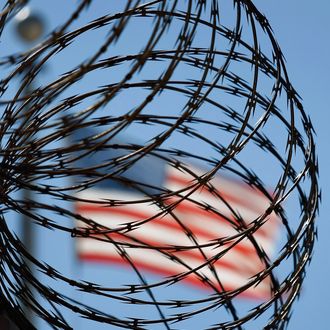
A U.S. Navy nurse has been reassigned after refusing an order to force-feed Guantánamo detainees for ethical reasons. “There was a recent instance of a medical provider not willing to carry-out the enteral feeding of a detainee,” a Pentagon official told CNN, adding that “the service member has been temporarily assigned to alternate duties with no impact to medical support operations.” The news was leaked by attorney Cori Crider, who represents prisoner Abu Wa’el Dhiab. For the past 18 months, many Guantánamo detainees have been on hunger strikes, and Crider says the unnamed male nurse is the first known military officer to rebel against the Pentagon’s controversial force-feeding policy.
According to the Miami Herald, Crider says she learned about the nurse in a phone call with her client, who is on a hunger strike and has filed a federal lawsuit protesting the policy. Dhiab was cleared for release in 2010, but he has not been transferred owing to unrest in his home country of Syria. Dhiab described the nurse as a Latino man in his 40s who showed up in the prison in April or May. He said that while the nurse initially performed force-feedings, in which the prisoners are restrained and a tube is put up their nose and down their throat, he was “very compassionate.” “Here, whenever a person has a fever or is sick, the typical force-feeding crew were still very rough with you,” Dhiab said, according to Crider. “However, when he came to the block and saw that the person had a fever or was sick, he would say, ‘OK, because you are sick, you are not able to receive force-feeding’ and left them alone for that day.”
Some time before the Fourth of July, the nurse abruptly refused to do the force-feedings. Dhiab says he announced, “I have come to the decision that I refuse to participate in this criminal act.” After that, he disappeared from the cell block.
Retired Army Brig. General Stephen Xenakis, a psychiatrist who frequently visits the facility, said he doesn’t believe the nurse’s career will suffer, as officials have “said to us directly that if a provider objects for ethical reasons or other reasons they would not be ordered to participate — and they would not suffer any adverse consequences.”
While the military refused to identify the nurse and said he will not be made available for interviews, Crider said he should be allowed to give evidence to the judge handling Dhiab’s case. “This nurse showed incredible courage — to see the basic humanity of the prisoners and to recognize that force-feeding is wrong is a historic stand,” Crider said. “It meant a great deal to my client and to the other cleared detainees who are hunger striking.”






























